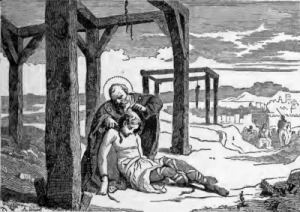 Saint Wulfran
Saint Wulfran
Archbishop of Sens (647-720)
Feast – March 20
Since 496 when St. Remigius baptized Clavis I King of France the Catholic faith became predominant in this region and consequently the economic situation improved.
In AD 567, Austrasia became a separate kingdom within the Frankish kingdom and was ruled by Sigebert I. In the 7th and 8th centuries it was the powerhouse from which the Carolingians, originally mayors of the palace of Austrasia, took over the rule of all Franks, all of Gaul, most of Germany, and Northern Italy. Under the rule of Chlothar II called the Great or the Young and later his son Dagobert I Frankish society experienced greater integration.
Meanwhile in the Frisia region to the north, along the southeastern corner of the North Sea, part of the modern day Netherlands and northern Germany, Germanic pagans continued their barbarous custom of sacrificing human beings to idols.
In this situation in year 647 in the diocese of Meaux, at Mauraliacus, near Fontainebleau, St. Wulfran, son of a knight attached to the court of Dagobert I, king of the Franks, was born.
He was educated by the successor of Dagobert, at King Clovis II’s court and showed a gift for academic learning.
The Saint spent some years in the court of King Clotaire III and his mother, St. Bathildes; but he occupied his heart only with God, despising worldly greatness as empty and dangerous, and daily advancing in virtue. He renounced the world and received sacred orders; his estate he bestowed on the Abbey of Fontenelle, or St. Wandrille, in Normandy.
He was nonetheless called to the court of Theuderic III. This seems to have propelled him into greater prominence. When the archbishop of Sens died, he was chosen in 692 to replace him, by the common consent of the clergy and people of that city. He governed that diocese with great zeal and sanctity.
By 693 he was in the post as he attended an assembly of bishops at Valenciennes.
In 695, he resigned the archbishopric in favor of St. Amatus, who, it seems, he thought would be better at that sort of work and retired to the Benedictine abbey called “Fontenelle”.
It was a tender compassion for the blindness of the idolaters of Friesland, and the example of the zealous English preachers in those parts to enter Frisia as a poor missionary priest.
On the voyage by water, the deacon who served him at the altar, accidentally dropped the paten into the sea. St. Wulfran told him to place his hand where it had fallen on the waves, and it came up to him by a miracle. For long years that paten was conserved in the monastery of St. Wandrille. On this mission he baptized great multitudes, among them a son of their King, Radbod. In Frisia, people, including children, were sacrificed to the local gods having been selected by a form of lottery. St. Wulfram, having remonstrated with King Radbod on the subject, was told that the king was unable to change the custom, but Wulfram was invited to save them if he could.
On a certain occasion, one such unfortunate, a young boy, had been selected by lot as the victim of a sacrifice to the gods, or demons of the land. St. Wulfran earnestly begged his life of King Radbod, but the people ran tumultuously to the palace, and would not suffer what they called a sacrilege.
After many words they consented, but on condition that St.Wulfran’s God Himself save the victim’s life. The Saint prayed God to resurrect him, and the child, after hanging on the gibbet two hours and being left for dead, fell to the ground by the breaking of the cord. The servant of God went to him and told him to stand, which he did, and he was given to the missionary. He later became a monk and priest at Fontenelle.
St. Wulfran, after praying, also miraculously rescued a poor widow’s two children, seven and five years old, tied to posts and left to drown as the tide rose in honor of the idols; he walked out across the water in the sight of all the people, to take their hands and bring them back to land. The faith of the missionaries (and their power to work miracles) frightened and awed the people.
The religion of Christ began to take root in this pagan land, and many were converted. He retired to Fontenelle that he might prepare himself for death, and expired in peace there on the 20th of March, 720.
References and Excerpts
[1] “Wulfram of Sens,” Wikipedia. 08-Oct-2019.
[2] “Saint Wulfran, Archbishop of Sens.” [Online]. Available: https://sanctoral.com/en/saints/saint_wulfran.html. [Accessed: 07-Mar-2020].